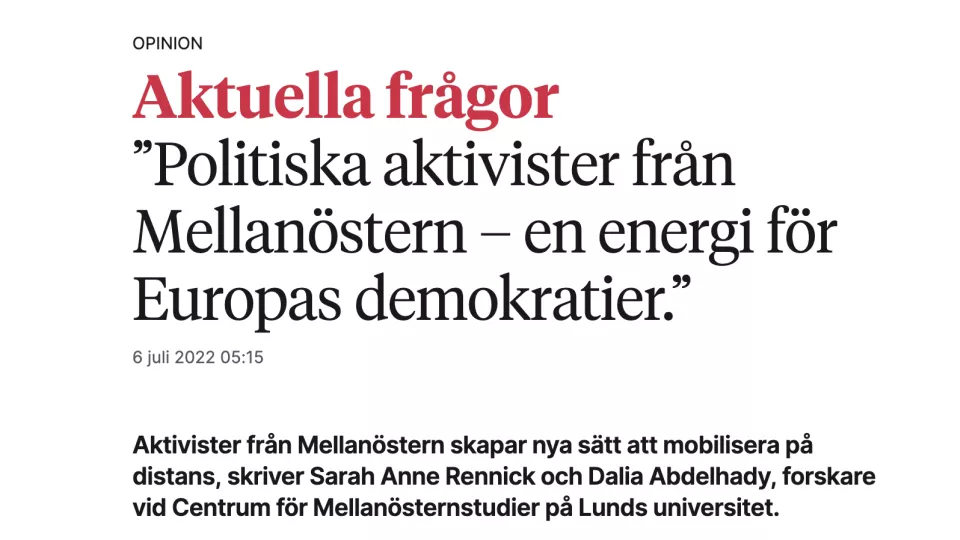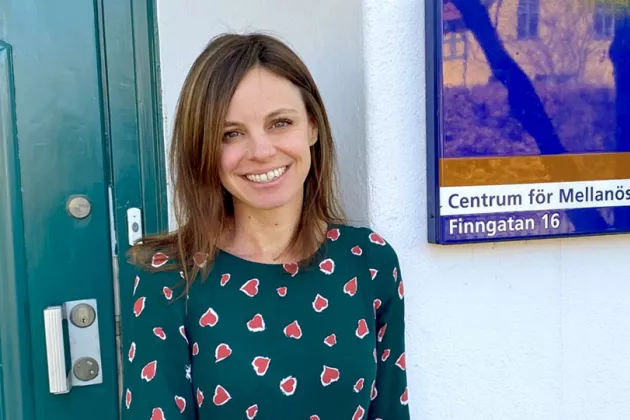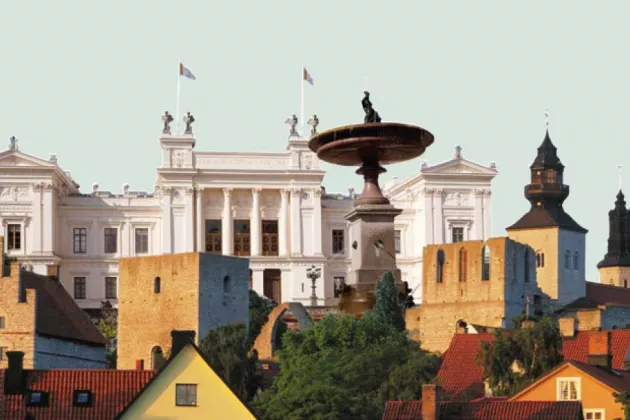Read the article in Swedish in Sydsvenskan
Last decade, pinpointing political mobilization in the Middle East was a straightforward affair. At present, describing the same process defies simple explanations. While common wisdom suggested that the small protests in marginalized Tunisia in December 2010 would quickly die down, what emerged instead was a breathtaking wave of mass mobilization that would sweep across virtually the entire region. The erstwhile Arab Spring – a name chosen not by the protestors themselves but rather outsiders who desperately wanted to read into the events the long-awaited arrival of liberal democracy in the southern Mediterranean – saw the removal from power of multiple long-standing autocrats, and several States along with them.
The outcomes of the 2011 revolutions in Bahrain, Egypt, Libya, Syria, and Yemen were largely bleak, but the second wave of mass mobilization that arose in the region in 2019 in Algeria, Lebanon, Iraq, and Sudan renewed hope in the potential for popular non-violent protest in bringing about social justice, full and equal citizenship, and egalitarian social contracts. And while these revolutionary moments garnered significant international attention, they were not the only times when political mobilization was occurring in the Middle East. On the contrary, in the years intervening the two waves of mass uprising, mobilization for political change never really ceased. Across the region, different populations and categories of the forgotten and exploited, from the indigenous inhabitants in Morocco to school teachers in Jordan to Gazan youth at border crossings, continued to mobilize for recognition as members of the nation, fairness in the distribution of resources, and justice for crimes and abuses.
Yet with the cascading crises since 2020 of economic collapse and pandemic, alongside the region’s interminable wars, popular political mobilization is under severe constraint. Everywhere, civic space is closing. Both Morocco and Jordan have utilized increasingly sharper legislative tools to curtail oppositional voices. In Egypt, prisons are filled with political activists and in Iraq they find themselves subject to targeted assassinations. In Libya, Syria, and Yemen, the ravages of over 10 years of war and the decision to broker any form of peace, no matter how negative, has empowered existing power holders to the detriment of others. Even in Tunisia, where a democratic transition was underway and political activism was vibrant, the drastic authoritarian backsliding that has been occurring since July 2021 has been met with a wait-and-see attitude on the part of civil society actors, whose silence belies their fear for personal security.
While overt displays of political mobilization may be waning as a result of cooptation and repression, the mobilization capacity certainly is not. Nor has the desire among the region’s political activists to see a total restructuring of their States and new social contracts emerge. The creative use of tools such a cause lawyering to fight rights violations in places like Egypt, or the painstaking process of building new electoral forces to unseat corrupt elites in places like Lebanon, still continue. And shifting our gaze away from the Middle East itself reveals that political mobilization is still alive, only reconfigured to represent the new geographic and geopolitical realities of the activists themselves.
Indeed, one of the many repercussions of the region’s deep economic and security deterioration has been the mass exodus of political activists to places of safe harbor, and Europe in particular. These leaders of political mobilization have not desisted from their causes; rather, they are finding alternative ways to mobilize from their positions in Europe and farther abroad. Lebanese activists across the diaspora have been connecting in virtual spaces to mobilize for accountability in the wake of the Beirut Port explosion. Syrian human rights activists have been working with European civil society actors to use universal jurisdiction to try war crimes committed by the Assad regime. And at the level of European cities themselves, activists from different Middle Eastern countries are founding new civil and scholarly initiatives to rethink what their position as Middle East political activists in displacement means to both their host and home sites, creating a new imagined European space that is linked by cities and not divided by national borders.
What we see emerging are not only new possibilities for achieving political and social change in the Middle East, building off the spaces and legislative frameworks and policy levers that being in Europe allows, but also a renewed energy injected into European democracies themselves. And importantly, these activist communities are not just remitting towards their home countries; they are also building new solidarities with European social movements and causes, and engaging in practices of active citizenship that enlarge what it means to be a citizen beyond identity papers. The solidarities built between Middle East diaspora activists and the European Black Lives Matter movement, for example, strengthens the capacity of all groups to achieve the changes they seek. In this sense, encouraging the political mobilization and participation of new Middle Eastern migrants represents a unique opportunity to revitalize our own democratic practices.
Sarah Anne Rennick's research profile





